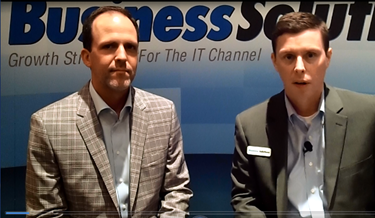Why Mobility Is An Important Trend In Healthcare — And To Healthcare IT VARs


In an exclusive interview at the Smart VAR Healthcare Summit, Business Solutions president Jim Roddy asked Jeff Fountaine (left), director of healthcare at Honeywell, for his perspective on mobility in healthcare and the opportunities it presents to VARs.
“It’s really an interesting opportunity moving forward. We’ve seen hospitals in the last three to five years really focusing on the deployment of their electronic medical records [EMRs]. Most have been for the full operating system or for their 22-inch monitor,” Fountaine commented. “Now what we’re seeing is a trend of migration — how do we take that electronic medical record and make it mobile?”
He said to consider the workflows of different IT users in a hospital — physicians, nurses, dieticians, respiratory therapists — who would benefit from mobile solutions that would enable them to view or enter information into EMRs from a mobile device.
Roddy pointed out, however, that in the healthcare market, it’s not just about selling a device. He cited Smart VAR Healthcare Summit keynote speaker Shahid Shah who said when VARs are approaching a potential healthcare IT client, they need to speak in terms of outcomes, not just speak in terms of devices.
Fountaine agreed. “It’s so critical. Healthcare is so unique when you think about other markets — think about retail or airlines or warehouse and distribution companies where it can be about productivity and how to generate more revenue per consumer,” he said. “In healthcare it’s not necessarily about how to generate more revenue per patient. It’s about how to take better care of the patient.”
He said a number of recent studies reveal that implementation of EMRs has taken time away from nurse interacting with patients — and one study showed 92 percent of nurses are dissatisfied with their electronic medical records.
Fountaine said one way to address that issue is through mobility technology. “It will allow more time interacting with the patient, which also will lead to improved outcomes.” He explained desirable outcomes can be defined as “when you leave the hospital, you are in better condition than you were when you entered.” He added, “And if you extend that, at the 30-day mark and the 60-day mark, you’re not returning to the hospital for that particular condition. That’s a key metric for hospital systems.”
He also pointed out there is a financial component as well. “One of the things we are seeing in healthcare is changing reimbursement. There are potential penalties. The hospital may not be reimbursed for the care they have to provide to a patient who returns for the same condition within 30 days.”
He stressed that mobility is currently an important trend in healthcare — and an opportunity for solutions providers. “That I think is the greatest opportunity facing the VAR community: how to take advantage of emerging trends and enter that space and design solutions that are of value to hospital systems.”
The Aug. 11 Smart VAR Healthcare Summit was held at the Renaissance Dallas Richardson Hotel. Smart VAR Healthcare Summits, powered by ScanSource and Business Solutions, are sponsored by: Honeywell, Datalogic, and Zebra.
